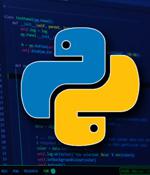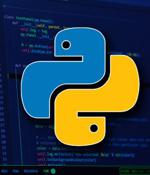Security News

Researchers have disclosed what they say is the first-ever Python-based ransomware strain specifically designed to target exposed Jupyter notebooks, a web-based interactive computing platform that allows editing and running programs via a browser. "The attackers gained initial access via misconfigured environments, then ran a ransomware script that encrypts every file on a given path on the server and deletes itself after execution to conceal the attack," Assaf Morag, a data analyst at Aqua Security, said in a report.

For anyone with interest in cybersecurity, learning Python is a must. The language is used extensively in white hat hacking, and professionals use Python scripts to automate tests.

GoDaddy breach: SSL keys, sFTP, database passwords of WordPress customers exposedGoDaddy, the popular internet domain registrar and web hosting company, has suffered a data breach that affected over a million of their Managed WordPress customers. Malicious Python packages employ advanced detection evasion techniquesJFrog researchers have discovered 11 malicious Python packages on PyPI, the official third-party package repository for Python, which have been collectively downloaded over 41,000 times.

JFrog researchers have discovered 11 malicious Python packages on PyPI, the official third-party package repository for Python, which have been collectively downloaded over 41,000 times. This is not the first time that malicious packages have been successfully introduced into online package repositories and will surely not be the last.

Cybersecurity researchers have uncovered as many as 11 malicious Python packages that have been cumulatively downloaded more than 41,000 times from the Python Package Index repository, and could be exploited to steal Discord access tokens, passwords, and even stage dependency confusion attacks. The Python packages have since been removed from the repository following responsible disclosure by DevOps firm JFrog -.

A high-severity code injection vulnerability has been disclosed in 23andMe's Yamale, a schema and validator for YAML, that could be trivially exploited by adversaries to execute arbitrary Python code. The flaw, tracked as CVE-2021-38305, involves manipulating the schema file provided as input to the tool to circumvent protections and achieve code execution.

Researchers have discovered a new Python ransomware from an unnamed gang that's striking ESXi servers and virtual machines with what they called "Sniper-like" speed. While the choice of Python for the ransomware is fairly distinctive, going after ESXi servers is anything but.

Operators of an unknown ransomware gang are using a Python script to encrypt virtual machines hosted on VMware ESXi servers. While the Python programming language is not commonly used in ransomware development, it is a logical choice for ESXi systems, seeing that such Linux-based servers come with Python installed by default.

Malicious libraries capable of lifting credit card numbers and opening backdoors on infected machines have been found in PyPI, the official third-party software repository for Python. A package dubbed noblesse, and five variants, would, we're told, look on Windows systems for Discord authentication tokens, and browser-stored credit card numbers, and siphon them off to remote systems.

The maintainers of Python Package Index last week issued fixes for three vulnerabilities, one among which could be abused to achieve arbitrary code execution and take full control of the official third-party software repository. The security weaknesses were discovered and reported by Japanese security researcher RyotaK, who in the past has disclosed critical vulnerabilities in the Homebrew Cask repository and Cloudflare's CDNJS library.